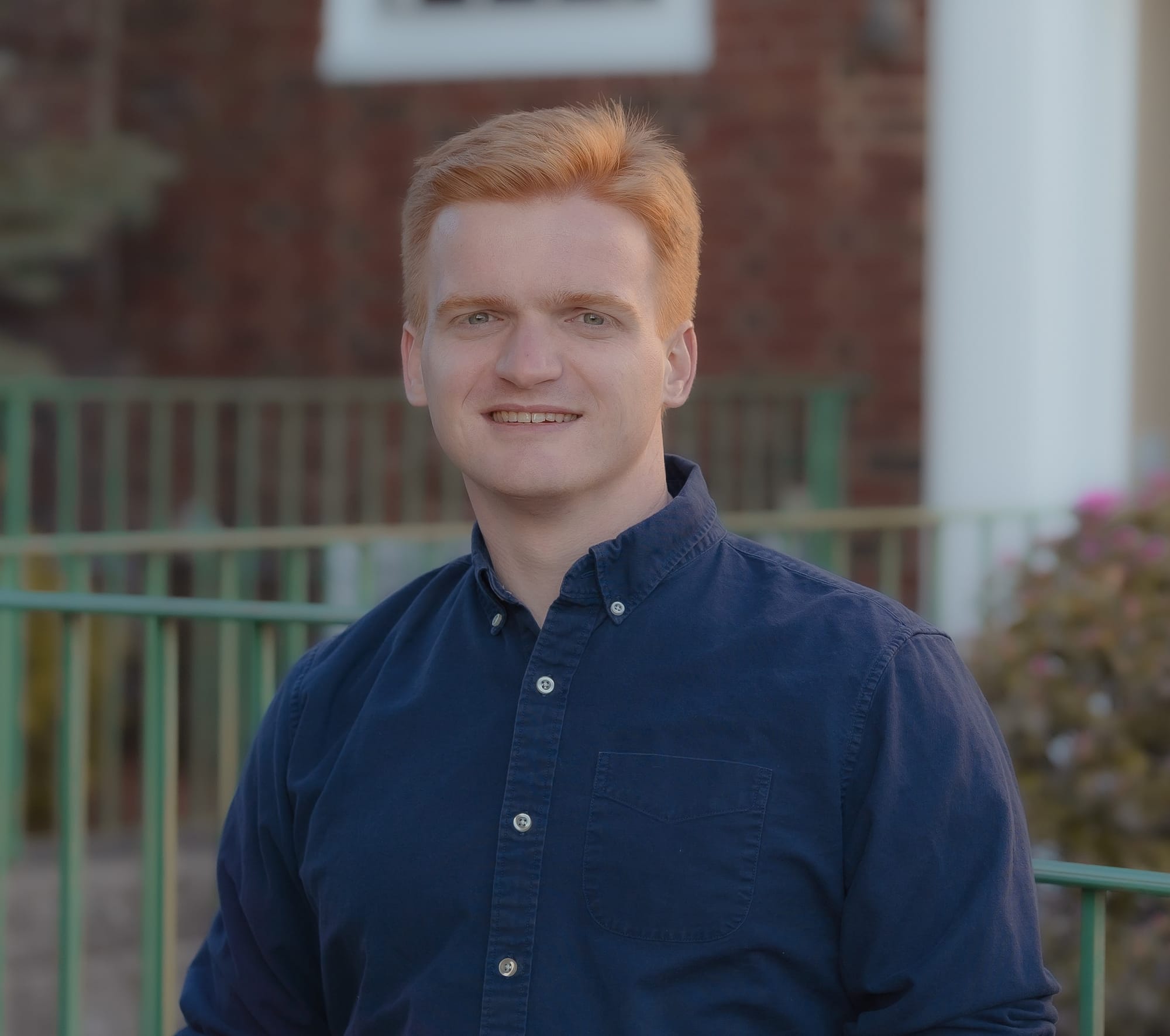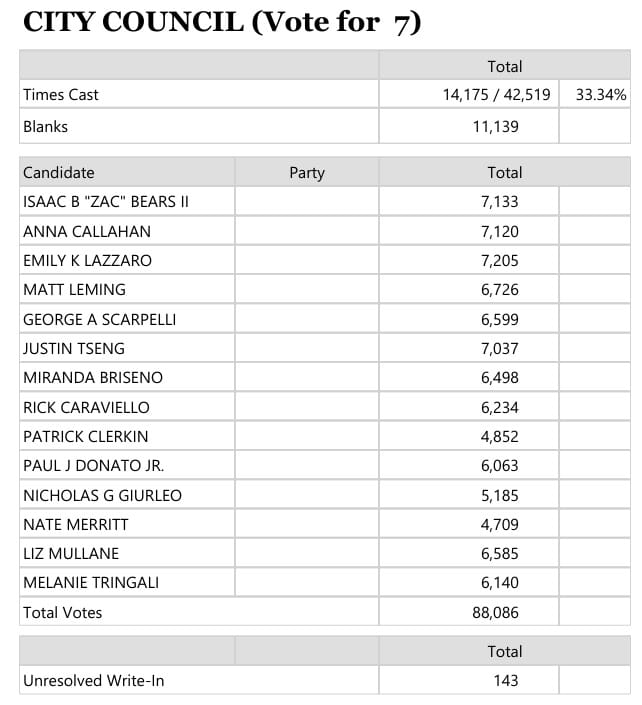Meet City Council Candidate Matt Leming
Incumbent

How many years have you lived in Medford?
Five.
Please describe your professional background and education.
I grew up in a military family and lived in five different states. My dad was a trumpet player in the Navy band before retiring and my mom is a homemaker. I earned a bachelor’s and master’s in computer science (with minors in Russian and mathematics) from the University of North Carolina at Chapel Hill and a Ph.D. at the University of Cambridge on a Gates-Cambridge Scholarship, where my research focused on AI to diagnose brain diseases from MRI. I completed a postdoctoral fellowship at Massachusetts General Hospital from 2020 to 2025 before moving to industry, and I commissioned in the Navy Reserves in 2022.
What, if any, city positions (appointed or elected) have you held, and for how long?
I was appointed to the Charter Study Committee and the Community Preservation Committee in 2022. I stepped down from both roles when I was elected to City Council in 2023, and I began serving on the council in 2024.
What volunteer roles have you participated in that you feel have made a difference in Medford?
Before I was elected, I worked with Housing Medford to lobby City Council to pass the Affordable Housing Trust. I also attend the Unitarian Universalist Church. I was also a mentor for Partners for Youth with Disabilities.
Why should residents vote for you?
Medford’s not affordable, and we need councilors who take that problem seriously enough to put forward concrete and specific proposals to address it. I’ve worked particularly hard to fund the Affordable Housing Trust and push for programs in the rezoning process to incentivize affordable housing and traffic reduction initiatives. I also instituted a program to house in-need veterans, as well as an additional fund for veterans that residents can voluntarily donate to.
This past term, I’ve worked to bring a lot of concrete benefits to council, notably to seniors, veterans, and non-English-speaking residents that are vulnerable to current federal policies. I pushed through the Welcoming City Ordinance to afford some protections to our immigrant neighbors from federal policies, as well as a campaign to inform them of their rights. I’ve also made the council a lot more transparent, which I talk about in my answer below. I was also involved in the override campaign, coordinating and training the parents who were doing a lot of the door knocking, which helped save 40 teaching jobs and invest in a crew to repair our roads.
In short, I’m putting in the work to move Medford forward, and I hope residents will give me the opportunity to continue that work.
What do you believe are the top 3 issues currently facing the city of Medford? How do you specifically plan to address those issues?
Displacement and affordability. Medford is part of our increasingly imbalanced economy, and it’s difficult for seniors and working-class residents to stay in increasingly expensive metropolitan areas. Locally, this can be addressed by more housing options, which Medford lacks.
The City Budget. This affects everything, including the state of our roads, the quality of our schools, and our ability to preserve and maintain green space. Medford has one of the lowest per-capita municipal budgets in the Commonwealth, which prevents us from adequately serving residents, fixing our roads, and funding our schools. The overrides were a method to avoid an immediate fiscal cliff, but moving forward we need to get serious about development, and the biggest lever Council has to help with this is rezoning our commercial areas. Council already rezoned Mystic Avenue and Salem, and we’re working on West Medford Square and Medford Square.
Housing. Since 1984, US rents have risen 323%, average home prices 441%, and median household income 37%. Medford simply doesn’t have enough options — for young professionals, seniors who may want to downsize without leaving the city, et cetera — and we’ve only built 300 new units since 2020, which is far behind our neighbors. This causes other issues as well, like more cars on the road caused by more commuters, which causes more pollution and damage to our infrastructure. This past term, I’ve worked to fund our new Affordable Housing Trust, campaigned to prevent teacher layoffs and repair our roads and, moving forward, we need to get residential rezoning right to incentivize affordable housing while also maintaining green spaces and historical buildings.
Transparency and communication are vital in representative government. What steps will you or have you taken to keep your constituents informed about local decisions and to explain your voting rationale?
In my personal capacity, I send out a newsletter, with an accompanying blog post, every two weeks, and I’m always trying to add people to that (https://www.mattleming.com/blog). If I made a decision on City Council that I feel requires more explanation or nuance, it’s usually accompanied by a lengthy blog post and sometimes a video. I did this with the School Committee raises earlier in the term (https://www.mattleming.com/blog/school-committee-raises-the-final-vote) and the rezoning of Salem Street (https://www.mattleming.com/blog/to-make-a-difference-show- up-and-be-vocal). My most-read blog post was a Q&A on the overrides (https://www.mattleming.com/blog/2024-ballot-question-faqs).
On Council, I instituted a City Council newsletter, which we release monthly while in session, and I was also behind live-streaming our meetings to YouTube (https://www.youtube.com/@CityofMedfordMass/streams), which makes them more accessible and immediately re-watchable to everyone. One resident even used this to automatically transcribe the meetings (https://medford transcripts.github.io/candidates_2025.html). Of course, not everyone has computer access, and that’s more challenging. So I’ve made it a point to have listening sessions at the Medford Senior Center regularly.
What specific methods will you use to gather and represent your constituents’ perspectives on issues that come before the City Council?
I knock on a lot of doors, and I gather data when I do. I also make sure that I’m talking to a lot of different groups so that I don’t get tunnel vision. Other basic practices, like replying to emails, attending events in different circles around the city, and putting out surveys, are also important.
The past two years, the City Council has been updating the zoning across the city. Many residents feel the process has been too quick and has covered too much at once. What are your thoughts on that? If elected, how would you approach zoning?
Residents’ opinions on rezoning vary wildly, and I try to not oversimplify. Many residents just feel they don’t know much about the proposals, which signifies that we need an outreach budget; many have very specific and nuanced concerns about certain aspects of rezoning, which we can continue to address by integrating their feedback into the proposals; many strongly support them; many are opposed any and all rezoning; and many feel that Council has been taking the many challenges facing Medford seriously — notably our inadequate budget and lack of affordable housing — by executing the plans that the city and community has been developing for years, namely the Comprehensive Plan. City Council already passed rezoning for Mystic Avenue and Salem Street as well as an incentive system for more environmentally friendly building practices, and the recent challenges with the residential rezoning proposal are a testament to why so many previous councils didn’t want to touch it and kicked the can down the road for so long. Our current zoning is nonconforming with many presently existing structures and often unclear to people who want to build here, so developers usually just get variances to build whatever they want. This leads to very patchwork growth.
In my view, it’s fine to slow down the residential rezoning process if it’s a way to get more specific feedback, buy-in from residents, and opportunities for education and outreach. I pay close attention to the residents who had very specific and actionable concerns with the proposals, because that’s the whole point of the process — getting feedback, iteratively improving upon it, and getting to a good working product that represents an improvement on what we have now.
In terms of specifics, I think joint public hearings between the City Council and CD Board would help avoid a lot of confusion. And Council needs more funds from the mayor’s office to renew the contracts of consultants working with us and get an outreach budget, which Council did not previously have. Residents are asking for a sustained public outreach campaign, and that takes money, so we need resources.
There have been City Council meetings that have gone past midnight. Do you really think these marathon meetings are serving the public? Should there be a time cap on meetings for everyone’s sake?
Something that would help — which I’ll push for if the new Charter passes and four new Councilors are added — is placing time limits on how long Councilors can speak on particular agenda items. A lot of the extended times is because Councilors talk way too much. But if you have an explicit time cap on a meeting, without additional time caps on both resident and Councilor speaking times, you incentivize a filibuster. The marathon meetings are usually caused by hot-button issues that attract a lot of people who want to speak on them. I don’t see explicit cutoffs as being productive in those cases because you’d essentially be telling a lot of those people to go home even though they’ve waited all evening to say their piece, without ever taking a vote on the issue.
Council made it so that we could hear more people during these sessions by switching the speaking time from five minutes to three minutes, which is more in line with what other communities do, so that we could hear more people during these meetings. One suggestion for reducing these meetings is to switch it from biweekly back to weekly regular meetings. That switch was made because Council used to have a lot more meetings that lasted less than an hour, which seemed trivial after a while. These days Council meets a lot more than it used to in committee, which is a more appropriate place for those very short meetings.




